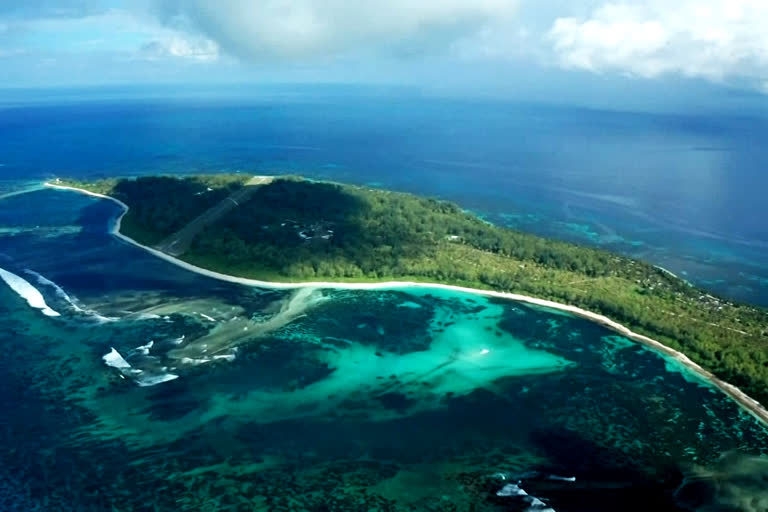Desroches Island: June 8 marks United Nations World Oceans Day, an annual event intended to inspire action to protect the ocean and sustainably use marine resources.
Earlier this year, Seychelles said it had successfully protected almost a third of its waters, ten years ahead of an international target.
The island nation of fewer than 1,00,000 people is already feeling the effects of climate change, with rising water temperatures bleaching its coral reefs.
It might seem small, but the wonders below Seychelles' deep blue waters appear endless.
Read also: Chinese team summits Everest amid bid to remeasure peak
The small island nation says it has protected 30 percent of its waters - around 4,45,000 square kilometres, a sea area larger than Germany.
"This 30 percent really means that we have done the right thing for the future generation, and protecting 30 percent of our 1.3 million square kilometres of EZ (exclusive economic zone) means a lot to a small country like Seychelles," said President Danny Faure, in an interview a few weeks before the announcement in March this year.
While Seychelles' 115 islands together add up to a land area about the size of San Antonio, Texas, its exclusive economic zone stretches to an area almost the size of Alaska.
Read also: Italy seas speak: No tourists and boats mean cleaner water
The island nation of fewer than 1,00,000 people relies on fishing and tourism.
Small island nations are among the most vulnerable to sea-level rise caused by climate change.
Land erosion, dying coral reefs and the increased frequency of extreme weather events threaten the existence of such countries.
Last April, Faure delivered what's thought to be the first-ever live speech from an underwater submersible, making a global plea for stronger protection of the "beating blue heart of our planet".
"We have a relationship with nature, and we depend on the ocean," says Faure.
"And achieving this is a very strong message to the next generation. And we are doing that for the present generation, but also we are doing it for the future generation."
Marine protected areas come in various different forms, but often include restrictions on environmentally damaging activities, such as certain types of fishing.
Around seven percent of the world's oceans are currently protected.
Countries have agreed to increase the area to ten percent by this year, but experts and environmental campaigners say between 30 and 50 percent of oceans outside nations' territorial waters should get protected status to ensure marine biodiversity.
Seychelles' announcement comes ten years ahead of a "30-by-30" international target, which is pushing for at least 30 percent of the global ocean to be protected by 2030.
"Out there this target seems to be unachievable, but we are seeing that if we have the right vision, the right structure in place, the right strategies in place, and we continue to work alongside with international partners, this can be achieved," says Faure.
In an interview before the March announcement, the Commonwealth's Secretary-General Patricia Scotland said the Seychelles was setting an example for others to follow.
"If Seychelles, who are such a small country, have been able to make this huge commitment for such a vast area of ocean, lots people are saying; 'So, what's our excuse? We're bigger, we are wealthier. Is it that we lack commitment? And if we lack commitment, how can we change that?'" she says.
Scientists around the globe are working to inform further ocean protection.
Last year, the British-led Nekton Mission spent seven weeks working in the waters of the Seychelles, documenting changes taking place beneath its waves.
A follow-up five-week mission, set to begin in March, had to be cancelled due to the coronavirus outbreak. Nekton said the expedition would be rescheduled when possible.
"Really understanding much more about what lives down there and what that lifecycle is, how they're interacting themselves as communities and assemblages, is going to be key for us to be able to sustainably manage our oceans," says Lucy Woodall, Nekton's principal scientist.
In 1998, Seychelles, in some areas, lost up to 90 percent of its coral reefs in an environmental event known as bleaching.
Conservationists have launched a number of reef restoration projects around the nation's 115 islands.
Leo Barret and his colleagues from the Marine Conservation Society Seychelles (MCSS) have established several coral nurseries with the aim of rearing stronger corals.
Taking broken fragments found around the reef, they rear them for a year before transporting them to artificial structures.
"What do you want your grandchildren to see?" asks Barret.
"Do you want them to see a sea full of plastic pollution, full of bottles, or you want to be able to show the future generation coral reef, the fish biodiversity, this is something specific from the ocean, specific on the earth, so I think we need to preserve that."
AP


